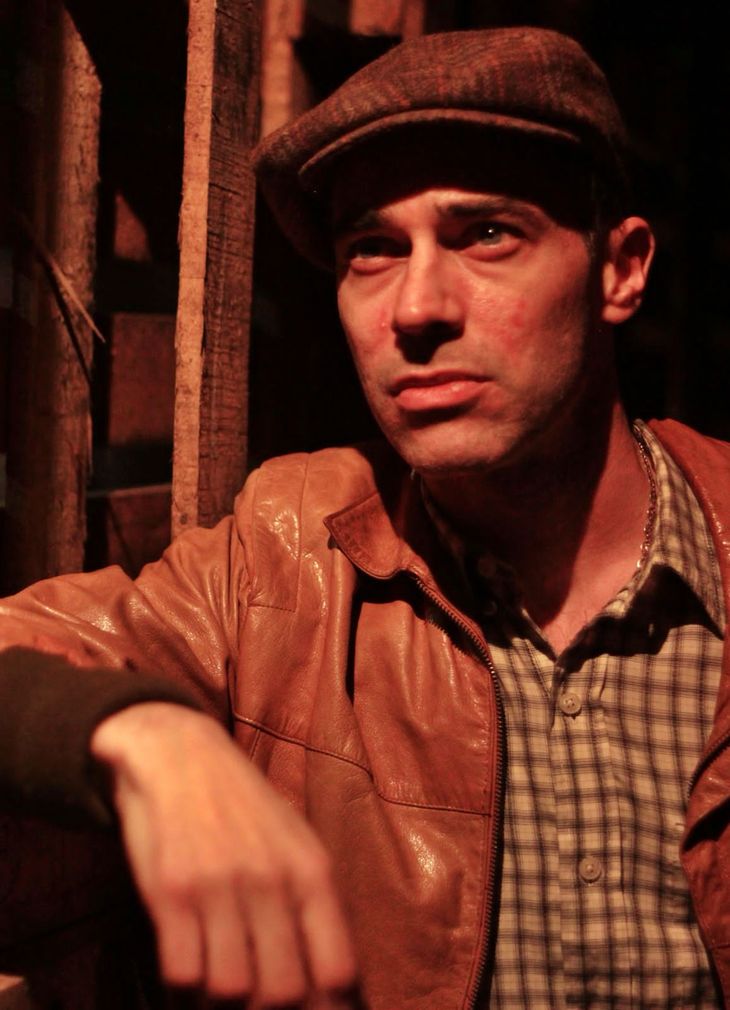“It seems that each one can save alone and thinking that he can get out. Today individualism is put in vogue as something good but you have to remember all the time that is the opposite,” says Rodrigo Raffeowho integrates the cast of “Vichy incident”, of Arthur Millerthat opens Thursday in Escalajón Espacio, Humahuaca 3759, at 20.30.
It is unusual to find today in the alternative theater circuit a choral work with no less than 15 actors on stage as well as there are no poster texts of Miller, That here addresses Nazism in France but speaks of as many issues as the cancellation of the human being. The action happens at a Vichy police station, France, in the mid -World War II, a city “released” from the Nazi occupation. It is the French city where the marshal was installed Philippe Petainpresiding over an authoritarian Government of the Nazi occupation in France.
Nine men and a teenager were arrested on the street to verify their identity documents, although the circumstances are suspicious. They do not prove to know why they are detained, although they begin to suspect. A homosexual actor, a former combatant psychiatrist, a Viennese prince, a communist electrician, a gypsy and a Jewish painter are just some of the characters in that waiting room, for which Rumors of concentration and trains of death circulate.
Among them the captors roam: Nazi officers, anthropologists and French detectives, which demonstrate the fury and violence of the human being. As they are called by the officers, some prisoners leave that office and others do not. Little by little, these prisoners will discover that what seemed to be a simple review of documents turns out to be the ratification of rumors about one of the greatest racial crimes committed in the history of mankind.
Adapted and directed by Pablo Gorleroit has actions of Mateo Chiarino as the Austrian prince; Patricio Coutoune as the psychiatrist; Rubén de la Torre as a German commander; Mario Petrosini like the actor; Junior Pisanu like the painter; Rodrigo Raffetto as the mechanic; Pablo Turchi the waiter; Enrique Iturralde as the businessman; Santiago Lozano as the racial anthropologist; Jerome Dodds like the boy; Marcelo Rodríguez as the coffee owner; Julián Mardirosian Like the old Jew; Mauricio Méndez like the gypsy; Mariano Sgallini as the police captain and Marcelo La Valle as the inspector and guard.
He Holocaust Museum and the Home Le Dorvador They were immediately interested in the project and added support, as well as Horacio Acosta Producciones and various Jewish institutions that add up to support and dissemination. The scenery and costumes are from Gabriella Gardelics; The design of lights of Ricardo Sica; The music and sound design of Fernando Nazar; The assistance of the management of Carlos Farías; Commercial production of Susana Jarabroviski, Photography of Fiorella Romay and graphic design of Juan Salvador de Tullio.
We talked with Raffeto About the work.
Raffeto (1) .jpg
Rodrigo Raffeo embodies Bayard, a Marxist mechanic who knows very well that his fight against injustice will never be in vain. He is very informed about what is happening with the Nazis.
Journalist: What attracted you to the proposal to want to join this mass cast, for an OFF work?
Rodrigo Raffeo: First of all, Miller’s works I always liked even though I didn’t know this. De Gorlero had good references as director, who told me that he had a political principle for which he wanted to do the work. It is rare for a director to convene for something that has a personal and social sense, that is not just a whim. Something that Gorlero wanted to give society and that seemed exceptional, put me at the service of something. Many times acting is art for art, and doing this today, as we live, makes a lot of sense. Since I started rehearsing all the time, the human condition of something that was written so long ago is revealed. It has so much news that it seems that we never change.
Q.: What is the validity of this work? Why do it today?
RR: There are several factors but would highlight individualism. In the work, it seems that each one can be saved alone, all the faceful positions of the characters that are detained are different. Each one throws to his side thinking that he can get out. Today individualism is put in vogue as something good but you have to remember all the time that is not so. The networks have some of that, when one says that it is without work they tell you doing an influencer or crypto. Handle Uber, all on your own, if you can’t be because you don’t want to, do only, sell you, there are no excuses, you can only against everything, and you have to remember that it is the opposite. There is little acceptance of working together, it costs the idea of team, people have trouble entering a work in a dependency relationship and being part of a major gear.
Q.: How can you relate what you say to the work and your character, Bayard?
RR: My character is involved in the trains union and if one sees the application jobs today, which have to do with the delivery, there were initiatives to unite workers and were rejected by themselves, who think it is better to be alone than to do something together. The unions and the rights won were given so much dent, so many were criticized for understanding that they were glued to the governments on duty and enriched themselves at the expense of the workers, that people think it is a garbage. However, the one who works from Uber if he gets sick does not pay anyone, the same vacations. That conscience was lost and became individualism.
Q.: What else can you say about your character and the contrast to others?
RR: He is a communist who is decidedly against fascism and shows him. He is the first to open the political game in the work, until he speaks seems that nobody talks about politics. Each one has their opinion on the matter and my character is convinced that the Union of Workers will save humanity and that capitalism is not the answer to us all well. One accommodates within the spectrum that was born but fallen people are difficult to get on. The great fortunes set aside those who cannot be incorporated. In the Second War the workers had a dilemma: they felt that their patterns were defeating their homeland for resources and at the same time wanted to fight for the homeland and enlist in the army. There is that ambivalence to battle the Nazis knowing that those who had made the arrangements for war were precisely their patterns. A war also for economic disputes. My character knows that it is better to group and I agree with that.
Q.: This work is also attractive in the counterpoint of the characters, which other attracts and question you?
RR: Lebeau, the painter, I love it because I share the feeling and artistic look of life, more irrational, when one is on his artistic path and lives hanging from a palm tree without taking care of all the time of how things have to be. I love people who think of colors and painter represents that.
Q.: How much did you know about the Holocaust before linking with this project?
RR: I knew him as a historical fact, for having seen films and reading, however, I never had a direct relationship with people from the community, he did not touch me in a neighborhood, or for closeness, or at school, or family, nothing like that, but it always seemed like a central theme in history. I didn’t see him distant, maybe because I saw my old man many times “Schindler’s list.” The book “The man in search of meaning” also marked me, he moved me, he never passed me on the side. So much human suffering is an important wound in the history of our humanity. In addition to being something quite recent. I like to be adding it, I think I do it with respect, in the group there is a lot of respect. We went to the Holocaust Museum, Le Dorvador, I feel close to the communities other than me, it may have to do that feeling Buenos Aires or Argentine, being in community with the other and accepting it, being curious and trying to understand diversity. Hopefully the public after the functions want to talk to us and share stories, for that we do theater, to continue nourishing us with life.
Source: Ambito
I am an author and journalist who has worked in the entertainment industry for over a decade. I currently work as a news editor at a major news website, and my focus is on covering the latest trends in entertainment. I also write occasional pieces for other outlets, and have authored two books about the entertainment industry.




